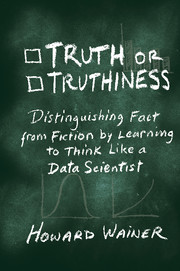Book contents
Preface and Acknowledgments
Published online by Cambridge University Press: 05 December 2015
Summary
There have been many remarkable changes in the world over the last century, but few have surprised me as much as the transformation in public attitude toward my chosen profession, statistics – the science of uncertainty. Throughout most of my life the word boring was the most common adjective associated with the noun statistics. In the statistics courses that I have taught, stretching back almost fifty years, by far the most prevalent reason that students gave for why they were taking the course was “it's required.” This dreary reputation nevertheless gave rise to some small pleasures. Whenever I found myself on a plane, happily involved with a book, and my seatmate inquired, “What do you do?” I could reply, “I'm a statistician,” and confidently expect the conversation to come to an abrupt end, whereupon I could safely return to my book. This attitude began to change among professional scientists decades ago as the realization grew that statisticians were the scientific generalists of the modern information age. As Princeton's John Tukey, an early convert from mathematics, so memorably put it, “as a statistician, I can play in everyone's backyard.”
Statistics, as a discipline, grew out of the murk of applied probability as practiced in gambling dens to wide applicability in demography, agriculture, and the social sciences. But that was only the beginning. The rise of quantum theory made clear that even physics, that most deterministic of sciences, needed to understand uncertainty. The health professions joined in as Evidence-Based Medicine became a proper noun. Prediction models combined with exit polls let us go to sleep early with little doubt about election outcomes. Economics and finance was transformed as “quants” joined the investment teams and their success made it clear that you ignore statistical rigor in devising investment schemes at your own peril.
These triumphs, as broad and wide ranging as they were, still did not capture the public attention until Nate Silver showed up and starting predicting the outcomes of sporting events with uncanny accuracy. His success at this gave him an attentive audience for his early predictions of the outcomes of elections. Talking heads and pundits would opine, using their years of experience and deeply held beliefs, but anyone who truly cared about what would happen went to FiveThirtyEight, Silver's website, for the unvarnished truth.
- Type
- Chapter
- Information
- Truth or TruthinessDistinguishing Fact from Fiction by Learning to Think Like a Data Scientist, pp. xiii - xviiiPublisher: Cambridge University PressPrint publication year: 2015



